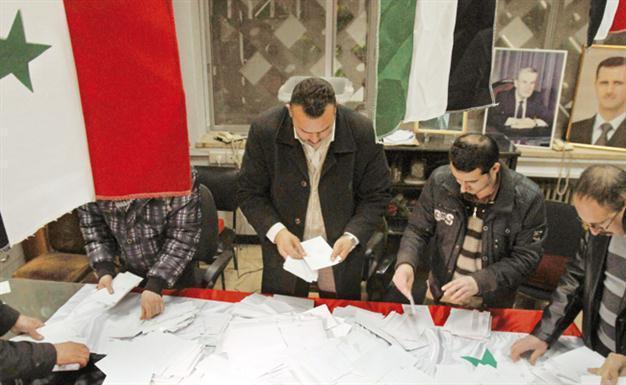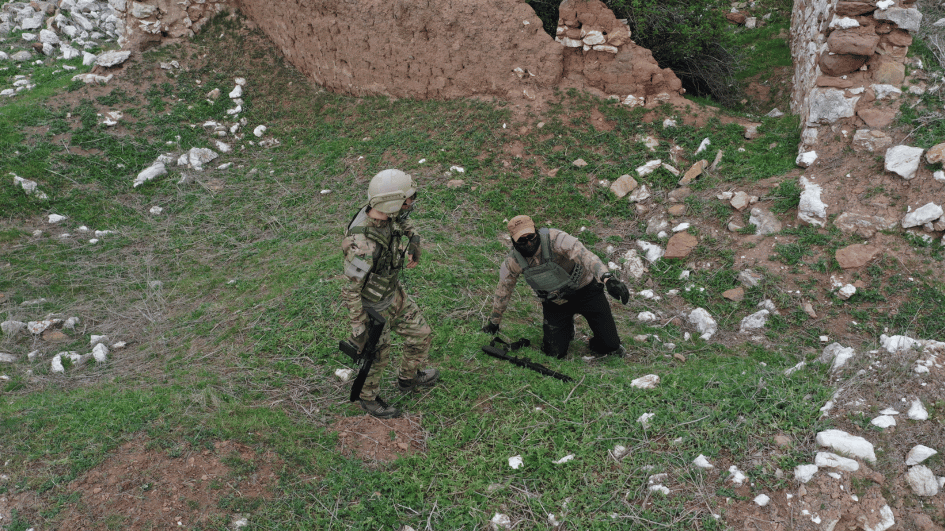Syrians' test with democracy
HANDE AŞIK DAMASCUS

Syrian government workers count ballots at the end of the voting day on the referendum for a new constitution in Damascus on Feb 26.
Syrian TV screen in the office of Khalaf al-Muftah, the General Manager of two government newspapers, Tashreen and Sawba, showed a striking image of the Syrian referendum on constitutional change. The polling station was just 3 floors below the office, on the first floor of the media building. The citizens who came there to vote could not quite bring themselves to leave.The same lady in pink stood staring behind an interviewee after having been interviewed about 5 or 6 times herself. Voting at that polling station was an occasion to see and to be seen. We, as a group of 12 Turkish journalists, were there to witness it.
The polling station, which we visited as a part of our government-organized trip, offered quite a different voting experience in other respects as well. Some Syrians did not mind going into polling booths in pairs or groups of three - and they were neither first-time voters nor the elderly. The ballots could be picked up like travel brochures from the desk of observers – in fact everyone in our group has a copy – and were not placed in sealed envelopes as they found their way into the ballot box. The identification process of voters was obscure, and the voters did not mind openly declaring that they had voted “yes” before they had even left the room.
Of course, this is just one polling station among many and it is not fair to generalize. However, it is worth noting that our efforts to visit a station in one of the more problematic suburbs of Damascus were stonewalled by our trip-organizers, who argued that those areas were not safe.
All of this is not to say that support for the Syrian regime does not have a solid base in central Damascus. On Sunday – the first week day in Syria - there were families, middle-aged and middle-class women and the elderly at a pro-government demonstration in the Seven Seas Square, in front of the Central Bank.
A day before, I observed a similar situation as I interviewed Syrians at Bab Touma area of Old Damascus. Support for al-Assad runs deep and cuts through age, class and gender among the Syrians who agree to speak to the journalists of a government-sponsored trip. However, those who speak also seem to be sincere in their feelings of entrapment, as they complain of a foreign conspiracy against Syria. They do show hints of compassion about the fate that “may have” befallen on their civilian compatriots in other parts of the country, but they have neither a sense of urgency about it nor an understanding of how deep the wounds are. Comparing scenes in central Damascus to the videos we have seen from places where the uprising is stronger, one cannot help but think there two irreconcilable truths in Syria, and neither side has the intention of listening to the other.
Overall, Damascus does not look like the capital of a regime that is about to fall. However, the debate about whether the opposition has reached Damascus needs some fine-tuning. While the government sources are particularly keen to show that life in Syria - and especially in the capital - goes on as usual, it must be noted that Syrians have an interesting sense of distance.
Zabadani, to which we have not yet been taken, is merely 35 kilometers from central Damascus. Douma is half an hour to the north-east. Both have been declared off-limits to us so far, for “fear of our safety.” While the majority of the people that we have interviewed say that they do not have security concerns in their neighborhoods, the words of one woman who I interviewed near Bab Touma were remarkable. She lives in the countryside, about half an hour away from the city, and said she started going home before the night falls, because she is afraid of checkpoints by established by the opposition’s Free Syrian Army.
















